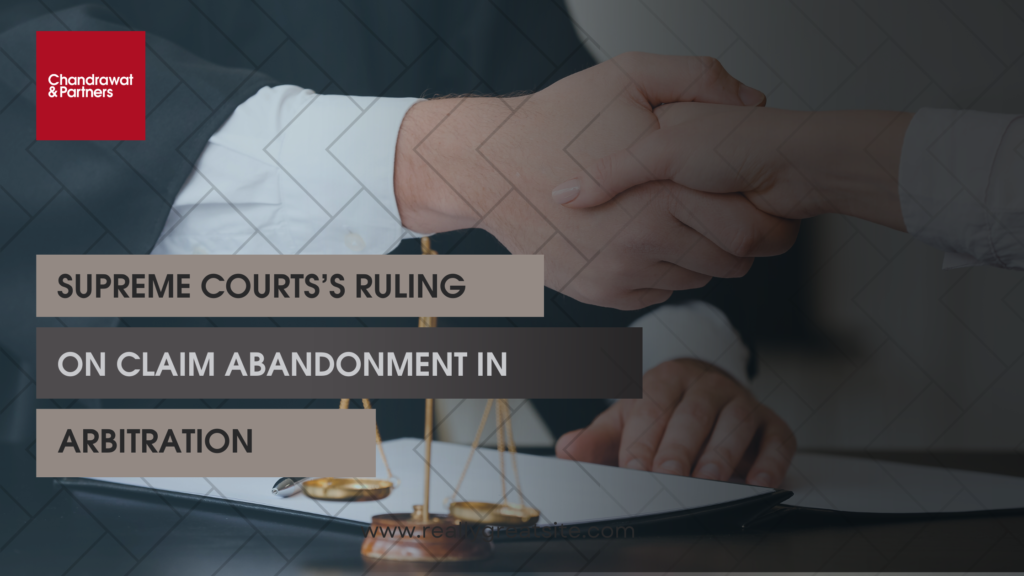
Share :
SUPREME COURT RULINGS ON CLAIM ABANDONMENT IN ARBITRATION
In Dani Wooltex Corporation & Ors. v. Sheil Properties Pvt. Ltd. & Anr. 2024 INSC 433, the Hon’ble Supreme Court has dealt with the issue of abandonment of claim by the claimant as a ground to terminate arbitral proceedings by the arbitrator.
BACKGROUND
The appellant was engaged in a complex legal entanglement with the respondent no. 1 and respondent no. 2, over land development agreements and property transactions. Disputes arising from these agreements led to multiple lawsuits and eventually to arbitration. Respondent no. 2 filed a suit that triggered the appointment of an arbitrator.
However, while respondent no. 1’s claim progressed to an award, respondent no. 2’s claim seemingly stalled. After two years, appellant sought to dismiss respondent no. 1’s claim, alleging abandonment of property. Respondent no. 1 objected, arguing that he had not abandoned arbitration.
The arbitrator nonetheless terminated proceedings under Section 32(2)(c) of the Arbitration Act (“Act”), prompting respondent no. 1 to challenge the decision in the High Court. The court, invoking its powers under Section 14(2) of the Act, overturned the termination, directing the arbitrator to resume proceedings. This order of the High Court was challenged by respondent no.1 before the honourable Supreme Court in the present proceedings.
PARTY’S CONTENTIONS
Supporting the judgment of High Court, the Appellant argued as under: –
- That the arbitrator was entitled to invoke the power under Section 32(2)(c) of the Act if it is proved that the proceedings have become impossible due to the respondent’s inaction.
- Section 14 of the Act bars the Courts to second-guess the Arbitral Tribunal, especially when the decision of the Arbitral Tribunal is based on the appreciation of facts and a plausible view has been taken.
- The word “unnecessary” used in Section 32(2)(c) of the Act will have to be widely or liberally interpreted.
Per contra, the respondent contended as under: –
- Without recording a positive finding that it is either unnecessary or impossible to continue the proceedings, the power under Section 32(2)(c) of the Arbitration Act cannot be exercised.
- The Court, while exercising the power under Section 14(2) of the Act, is required to go into the issue of the legality of the termination of mandate by the Arbitral Tribunal.
- The abandonment cannot be inferred.
LEGAL POSITION
The power under clause (c) of subsection (2) of Section 32 of the Act can be exercised only if, for some reason, the continuation of proceedings has become unnecessary or impossible.
However, its exercise demands a meticulous evaluation of circumstances, preventing hasty decisions counter to the Act’s purpose. The Arbitral Tribunal bears the responsibility to convene hearings, regardless of party requests, ensuring due process in dispute resolution. Absence without cause warrants recourse to relevant provisions, upholding procedural integrity.
SUPREME COURT RUILING
Respondent no. 1 regularly attended meetings held to hear respondent no. 2’s claim. In any case, there is no express abandonment. Even if it is to be implied, there must be convincing circumstances on record which lead to an inevitable inference about the abandonment.
In the facts of the case, there was no abandonment either express or implied. In a case where the claim is abandoned, the learned arbitrator can take the view that it would be unnecessary to continue the proceedings based on the already abandoned claim. The inference of the abandonment has been drawn by the learned arbitrator only on the grounds that respondent no. 1 did not challenge the respondent no. 2’s award and took no steps to convene the meeting of the Arbitral Tribunal. The failure to challenge the award on respondent no. 2’s claim will not amount to abandonment of the claim filed by respondent no. 1.
Hence, the finding of the learned arbitrator that there was abandonment of the claim by respondent no. 1 is not based on any documentary or oral evidence on record. Such a finding could never have been rendered on the material before the Arbitral Tribunal. Thus, the learned arbitrator committed illegality.
In view thereof, the honourable Supreme Court concurred with the decision of the High Court and dismissed the appeal filed by respondent no. 1 directing the parties to appoint a substitute arbitrator as the existing arbitrator refused to continue to serve as an arbitrator.
OBSERVATION
It can be extracted from the Supreme Court’s judgment that the power under Section 32(2)(c) of the Arbitration and Conciliation Act, 1996 can be exercised only if, for some reason, the continuation of proceedings has become unnecessary or impossible.
It was held that the mere existence of a reason for terminating the proceedings is not sufficient. The reason must be such that the continuation of the proceedings has become unnecessary or impossible.
For more information or queries, please email us at
enquiries@chandrawatpartners.com



